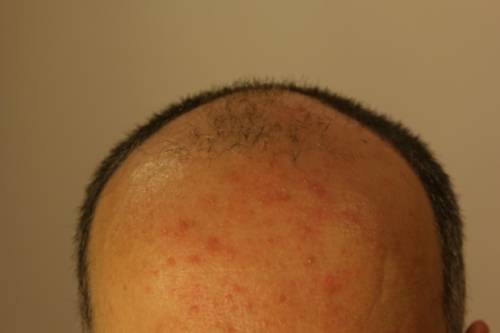 Close Topic Options
Close Topic OptionsHair Loss, What Causes It?
Hair Loss It - Psychology, Special Needs, Health - Posted: 12th Aug, 2017 - 1:26pm
Hair Loss, What Causes It?
Common belief is that baldness is hereditary or due to hats cutting off the blood flow to the scalp. I myself, having a receding hairline, wonder about this. My family has no baldness and I rarely wear hats. Currently I am thinking it may be due to increased activity within the brain, causing heat to burn out the hair follicles. What is your opinions on this?

Hair Loss, What Causes It? (Hover)
It What Loss Hair
People with thin hair are more prone to baldness, also stress increases the risk for hair loss. My family is full of thick haired men and women who wear hats constantly and none of them even come close to the description of bald until they reach a very old age (75+)
It What Loss Hair
Why do shorter men go bald more often?
Short men may have an increased risk of becoming bald prematurely. An international genetic study at least points in this direction. During the study, the scientists investigated the genetic material of more than 20,000 men. Their data show that premature hair loss is linked to a range of various physical characteristics and illnesses. Ref. Source 7f.
It What Loss Hair
Hair will fall out faster on a person that is on a crash diet.
Hair Loss, What Causes It?
Skin cells found at root of balding, gray hair
Researchers have identified the cells that directly give rise to hair as well as the mechanism that causes hair to turn gray - findings that could one day help identify possible treatments for balding and hair graying. Ref. Source 1d.
Hair Loss What It
Study sheds light on regulation of hair growth across the entire body. To paraphrase the classic poem, no hair is an island entire of itself. Instead, scientists have discovered that all hairs can communicate with each other and grow in coordination across the entire body. This is regulated by a single molecular mechanism that adjusts by skin region to ensure efficient hair growth - so no bald patches form - and enable distinct hair densities in different body areas. Source 1q.
Hair Loss What It Psychology Special & Health
'How to' guide for producing hair follicles. How does the skin develop follicles and eventually sprout hair? A new study addresses this question using insights gleaned from organoids, 3-D assemblies of cells possessing rudimentary skin structure and function -- including the ability to grow hair. Source 1b.
 TOPIC: Hair Loss, What Causes It?
TOPIC: Hair Loss, What Causes It? Bald - Balding
Bald - Balding